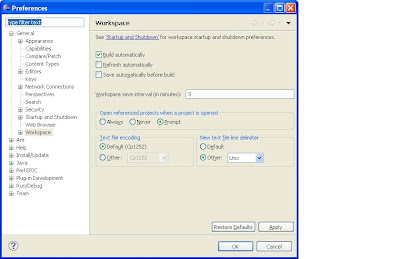Compare two columns and find out whats different.
Lets say you would like to compare col A1 and F1. Here is the logical if condition in excel you would use...
=IF(A1=F1,"","***")
The column would print *** when the values in A1 and F1 are different.
-Sunny
Wednesday, October 20, 2010
Thursday, September 9, 2010
useful cvs commands
If you made local changes and if you like to diff the latest version in repository,
cvs -Q diff -c StormAccrual.pl
cvs -Q diff -c StormAccrual.pl
Tuesday, August 10, 2010
Unix file processing
This command is very useful to analyze data files
cut -d ' -f |
single col :
cut -d '|' -f1 uncl_sims_audit_clr_code_null.txt | sort|uniq
multiple cols
cut -d '|' -f1-2 uncl_sims_audit_clr_code_null.txt | sort|uniq
enjoy..!
cut -d '
single col :
cut -d '|' -f1 uncl_sims_audit_clr_code_null.txt | sort|uniq
multiple cols
cut -d '|' -f1-2 uncl_sims_audit_clr_code_null.txt | sort|uniq
enjoy..!
Wednesday, July 7, 2010
Passing arrays to perl subroutines
Finally when we receive thes values in@_ variable then we can not recognize if we had passed one array or two value arraysbecause finally it is getting merged into one.
o
If you want to work with and identify the individual lists passed to Perl, then you need to use references:
(@listc, @listd) = simplesort(\@lista, \@listb);
The leading \ character tells Perl to supply a reference, or pointer, to the array. A reference is actually just a scalar, so we can identify each list by assigning the reference to each array within our subroutine. Now you can write your subroutineas follows:
sub simplesort
{
my ($listaref, $listbref ) = @_;
# De-reference the array list
my (@lista) = @$listaref;
my (@listb) = @$listbref;
# Now you can play with both arrays.
}
o
If you want to work with and identify the individual lists passed to Perl, then you need to use references:
(@listc, @listd) = simplesort(\@lista, \@listb);
The leading \ character tells Perl to supply a reference, or pointer, to the array. A reference is actually just a scalar, so we can identify each list by assigning the reference to each array within our subroutine. Now you can write your subroutineas follows:
sub simplesort
{
my ($listaref, $listbref ) = @_;
# De-reference the array list
my (@lista) = @$listaref;
my (@listb) = @$listbref;
# Now you can play with both arrays.
}
Wednesday, June 23, 2010
Syntax of inner join
select * from foo
inner join (
select 5 as bar
union all select 6
union all select 7
) as x on foo.bar = x.bar
inner join (
select 5 as bar
union all select 6
union all select 7
) as x on foo.bar = x.bar
Thursday, March 18, 2010
Change End of Line characters in eclipse
Remove Ctrl M characters in vi
To remove windows end of line characters, Ctrl M characters in vi
1) open the file in vi
vi
2) Type the following
To get ^M, press ctrl key on your keyboard and press v and m
:%s/^M//g
3) dont forget to save the file with :wq!
Enjoy.
1) open the file in vi
vi
2) Type the following
To get ^M, press ctrl key on your keyboard and press v and m
:%s/^M//g
3) dont forget to save the file with :wq!
Enjoy.
Subscribe to:
Posts (Atom)
